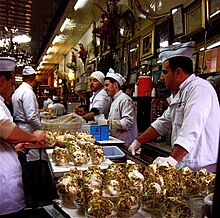Booza
This article needs additional citations for verification. (November 2017) |
 Booza being sold in the Bakdash ice cream shop in the Al-Hamidiyah Souq in Old city of Damascus | |
| Type | Ice cream |
|---|---|
| Place of origin | Syria |
| Region or state | Damascus |
| Main ingredients | Milk, salep, mastic, sugar |

Booza (Arabic: بوظة) is a kind of Arabic ice cream known for its elastic texture and resistance to melting. It is claimed to be one of the oldest forms of ice cream, and is most commonly found in the Levant and Egypt.
The ice cream is usually and traditionally made with an ingredient called sahlab (سَحْلَب) or salep, which provides it with the ability to resist melting. Salep is also a primary ingredient in the Turkish version of this style of ice cream called dondurma and the Greek ice cream kaimaki.
Iraq
In Iraq, it is customary to eat the ice cream on square wooden sticks.[citation needed]
Levant and Egypt
Booza is prevalent mainly in the Levant and Egypt, because of its proximity to the sources of sahlab and mastic. In the markets there, booza vendors pound it while singing and playing music.[citation needed]
Ancient Damascus
In Al-Hamidiyah Souq in the Old City of Damascus, there is an ice cream store named Bakdash that is known throughout the Arab world for its stretchy and chewy ice cream. It is a popular attraction for tourists.[1]
Australia
A brother and sister team (Jilbert El-Zmetr and Tedy Altree-Williams) pioneered and created the first packaged version of booza in Australia in 2011. Using local ingredients together with sahlab and mastic (from the island of Chios, Greece), they recreated the traditional form of booza and packaged this in a take-home format available to consumers. [2]
See also
References
- ^ Amos, Deborah (2013-05-04). [1]. National Public Radio. Retrieved on 22 July, 2018.
- ^ "Bring on the booza".
